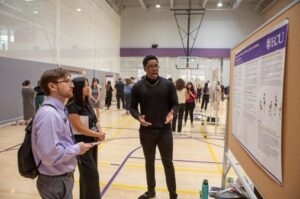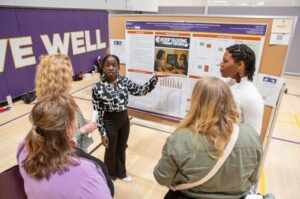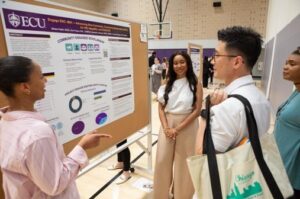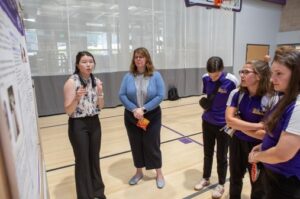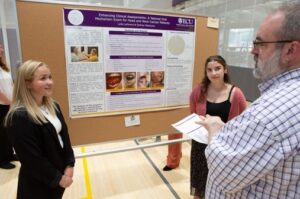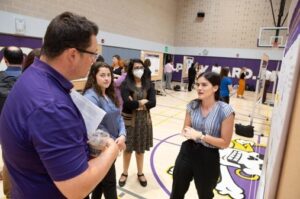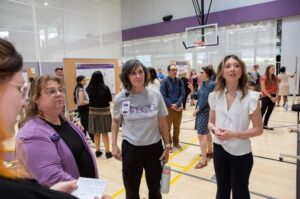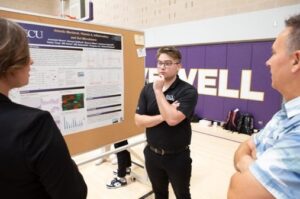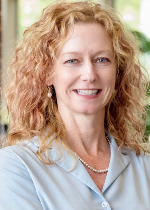CAHS Research Day 2025
Building a Culture of Collaboration: The Story of CAHS Student Research Day
In 2017, we launched the first CAHS Student Research Day with a simple vision: to foster a stronger, more collaborative research culture across the College of Allied Health Sciences. Before this, several departments hosted their own student research events, often limited to their own faculty and students. While these events were valuable, they lacked the cross-disciplinary interaction we knew could enrich the research experience.
We wanted to break down the silos between departments—encouraging faculty to explore work outside their own disciplines and allowing students to engage with new perspectives. At the heart of this effort was a belief that investing in students not only enhances their learning but also strengthens the overall productivity and innovation of our faculty. Creating a college-wide event was a natural extension of this philosophy.
As part of a broader initiative to support student research, I had previously introduced the CAHS Student Travel Award program. This provided financial support for students to present their research at state, national, and international conferences. CAHS Student Research Day became a perfect (and required) venue for these students to also share their work within the college—offering visibility, recognition, and inspiration to their peers. Today, around one-quarter to one-third of the presentations at Research Day are from students who have received a CAHS Student Research Travel Award during the year.
Our very first Research Day took place in the CAHS Lobby, with oral presentations in room 1305. The turnout was overwhelming. We featured 10 oral presentations and 50 posters representing seven departments. The space was packed, the energy was high, and the success made it clear: this event would continue each year—and it needed room to grow.
In the following years, we moved the event to the ECHI building, using the auditorium for oral sessions and conference rooms for posters. Participation steadily increased, with growing interest from both students and faculty.
Then came Spring 2020. COVID-19 disrupted everything—but our commitment to research and student engagement continued. With students already prepared to present, we pivoted to a virtual format, holding CAHS Student Research Day online for two years. It wasn’t easy, but the event remained a meaningful platform for student scholarship and connection.
In 2022, we returned to an in-person format, this time in the Health Sciences Student Center. We took over the ballroom for oral presentations and transformed the basketball courts into a poster hall. The energy and excitement of an in-person event was back, and faculty and students were fully engaged.
In 2024, we introduced the CAHS Game Show—a fun, interactive way to close the day. Faculty and students formed interdisciplinary teams to answer questions based on the day’s presentations with some pop culture and ECU trivia added in to mix it up. The game encouraged interprofessional collaboration, deepened engagement, and brought a sense of celebration to the day’s achievements. It was a wonderful addition that came from the CAHS Research Committee, and reinforced the spirit of collaboration.
That year also marked our largest Research Day ever, with 89 presentations across three poster sessions and two oral sessions. The event draws wide support from CAHS faculty and students, and we are proud to welcome guests each year from the Office of Research, Licensing & Technology, the Graduate School, and the Honors College—all of whom leave impressed by the caliber of work being done within CAHS.
Today, CAHS Student Research Day stands as a cornerstone of our College’s academic and research culture. It’s more than an event—it’s a testament to the power of collaboration, the importance of investing in students, and the value of creating shared spaces where ideas and people come together. To present, students must either be enrolled in a CAHS program or conducting research with a CAHS faculty member—ensuring a strong tie to the college’s mission and excellence.
See for yourself the program for this years 9th Annual Research Day!
Arghhh you smarter than… Research Day Game Show Winner
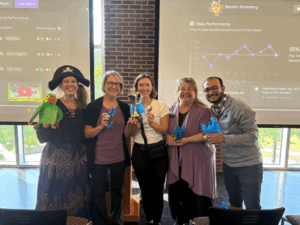
Our amazing Emcee – Dr. Denise Donica, Chair of Dept of Occupational Therapy and the team members of Teamless – Dr. Amy Gross McMillan, PTHE, Taylor Snodgrass, PhD student in Rehabilitation Sciences (CSD Concentration) and Ankur Padhye, PhD student in Rehabilitation Sciences (MSD Concentration).
Research Day Winners

Judges’ Award Winners – Oral Presentations
Samantha Powers (Rehab Sciences PhD Student – CSD Concentration) – Investigating lateral pharyngeal wall movement in velopharyngeal insufficiency: Impact of closure patterns and measurement location. Samantha Powers, Emma Steward, M’hamed Temkit, & Jamie Perry
Ankur Padhye ((Rehab Sciences PhD Student – MSD Concentration) – Carbon-fiber shoes and metatarsophalangeal joint contact forces during running at different speeds. Ankur Padhye, Stacey Meardon & John Willson
Judges’ Choice Award Winners – Poster Presentations:
Evin Hill (DPT student) – Improvement in saccadometry performance in people with concussion after physical therapy. Evin Hill, Shellie Zsoldos, & Chia-Cheng Lin
Madeline Campbell (DPT student??) – Interdisciplinary group exercise program improves functional mobility in individuals with Parkinson’s disease. Madeline Campbell, Chia-Cheng Lin, Lauren Turbeville, & Amy Wedge
Rachel Golden – Physical therapy management of pubic bone stress injury in a 38-year-old female runner. Rachel Golden, Stacey Meardon, Sarah Johnson
Jordan Cline (CSDI UG student) – Assessing SLP graduate program competencies in a student-led dysphagia pilot program. Jordan Cline, Hannah Shook, Deirdre Larsen
Marley Ray (CSDI UG student??) – Decoding benefactive and dative structures in agrammatic aphasia using eye tracking. Marley Ray, Grace Evans, Matthew Walenski
Madison Butcher (CSDI UG student) – Semi-automated measurement of vowel formant centralization to assess acquired apraxia of speech from narrative samples. Madison Butcher, Gracie Sweeney, Layla Beals, Lana Klein, Piper Savoie, Heather Harris Wright, & Matthew Walenskie
People’s Choice Award Winners – Oral Presentations:
Brody Morton (DPT student) – Effects of short and intensive bimanual training on coordination kinematics in children with cerebral palsy. Brody Morton, Shailesh Gardas, John Willson, & Swati Surkar
Rose Baker (Rehab Sciences PhD Student – CSD Concentration) – “Mmm… they look so good”: Brain stimulation influences sarcasm evaluation in the right TPJ. Rose Baker, Essence Hopkins, Peyton Disser, Katherin Palin, Anna Abernathy, Ke’Asia Craig, Moritz Dannhauser, & Kathrin Rothermich
People’s Choice Award Winners – Poster Presentations:
Brianna Baysek (MSOT student) – Psychological benefits of a Parkinson’s-specific exercise group: A qualitative analysis. Brianna Baysek, Kenley Easter, Mary Grace Meadows, & Lauren Turbeville
Kia Sehizadeh (Biology UG student) – Quantitative morphometric and uCT analysis of craniofacial skeleton in ADAP1 KO mice. Kia Sehizadeh, Paulina Sutton, Keerthana Surhabi, Jonathan Frank, Alexandre Vieira, Erzsebet Szatmari
